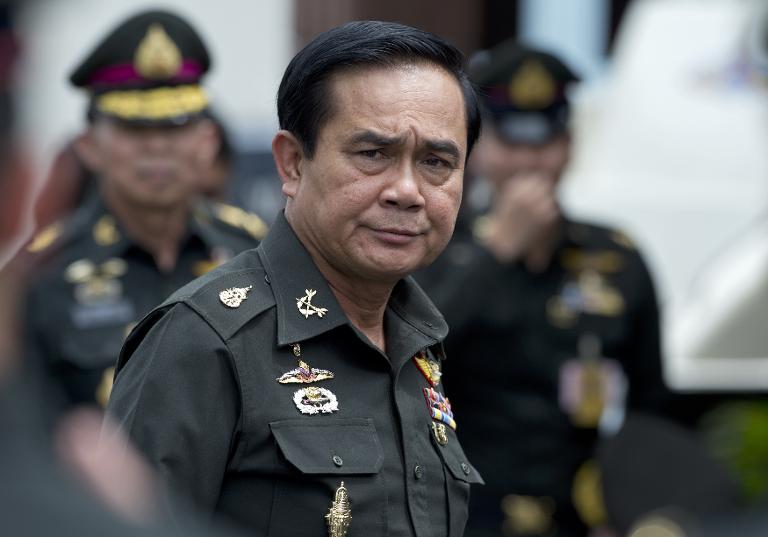Living under a regime of infinite jest
by Kong Rithdee

Thailand’s Prime Minister Prayuth Chan-ocha
Of course it was just a joke, how could it not be?
Nitpickers jumped on the chance to mock PM Prayut Chan-ocha when he said on Wednesday that he would like to use the magic bullet of Section 44 to ban the word “grassroots”, rakya in Thai, because the term only caused splits in our egalitarian post-coup utopia. “Call them ‘low-income’ or ‘people with little education’,” he said. “Today we have no class divisions.”
Twitter reporters quickly spread the news and headline writers rubbed their hands in glee, apparently taking the episode with the same seriousness as they take the new charter (which seems like a joke but isn’t). The true test of power is when you control vocabulary, and “grassroots”, everyone believed, would be guillotined. “People with little education” certainly sounds more unifying, more inclusive, more generous, than the lowly botanical metaphor of “grass” and “roots”.
Hours later, government spokesman Sansern Kaewkamnerd rushed to the rescue. He sternly explained that the PM was merely being funny, that no word would be axed from the dictionary, and that the world wasn’t quite on the PM’s witty wavelength. “Not having a sense of humour can create misunderstanding, and the media will lose credibility,” he half-rebuked the unfunny reporters.
The unfunny reporters also asked, when you have to explain that a joke is a joke, is it still a joke? When you have to explain a magic trick, is it still magic? When a comedian is mistaken for a professor, does that make him a professor or does he remain a comedian?
The inability to distinguish between a joke and a diktat is dangerous, thought the unfunny reporters on their way to a stand-up comedy. The inability to laugh at what we should be laughing at, like the beheading of “grassroots”, and be serious at what we should consider super-serious, like the National Strategic Reform and Reconciliation Commission — this is a tell-tale symptom of mass delusion. Soon we’ll lose the ability to distinguish between what’s real and what’s not, what’s wisdom and what’s hogwash, what’s an official policy and what’s just a daily gag of the man at the podium. And of course, since we’re so unfunny, just a bunch of humourless dorks, it’s all our fault that we’ve lost that power of distinction.
Now that the line has been blurred, we feel a little disoriented. The men in power often throw us off balance by saying things that hang precariously between a press briefing and a one-liner. The police chief said his men need “imagination” and “luck” to catch the Erawan shrine bombers, then he said he would ask for divine help from Lord Brahma — we were sure it was a joke, but it wasn’t.
The PM’s reference to the Blue Bloods detective series hours after the devastating carnage, too, sounded curiously like a jest — but he was serious. On Thursday, the regime’s top lawyer said that sending Line messages to attack the flaws of the new constitution was forbidden — we were sure it was a joke, and again it wasn’t. Earlier this week following the scandal of conscripts being assigned to do “maid’s work” at military officers’ homes, the army chief said without even blinking that no, those men weren’t “servant privates” but “serving privates”, and nothing’s wrong with that. Those verbal acrobatics were supposed to be taken seriously.
Going back a little, the classics also include “99 percent democracy” (serious), “the litters of Uighur children” (serious), “go sell rubber on Mars” (serious, pending Nasa notification), “Lee Kuan Yew could have saved Thailand” (you must be joking, or maybe not). Then we also hear the ongoing insistence from the constitution drafters that this new charter is Thailand’s most democratic, most coup-proof, most citizen-centric, and we’re not sure if we should laugh, clap, cheer, or look thoughtful at having heard something profound. Hardwired to trust the leader, we’ve lost the faculty to tell if we’re living in infinite jest scripted by the powers that be.
Thus the unfunny reporters were caught off-guard and concluded that the “grassroots” remark was dead serious. They should have known better; they should have noticed the cue to laugh held up by the assistants, like in a sitcom. They should know that “grassroots” has something to do with having “low income”, but it has more to do with disenfranchisement and powerlessness, and it has a lot to do with a large swath of the population who won’t find it very funny that their plight, their “little education”, has become material for a televised gag for the whole nation. They should realise that when the PM started a joke, it started the whole world crying.
To stay in the loop, bookmark Terra Thailand – The Blog.